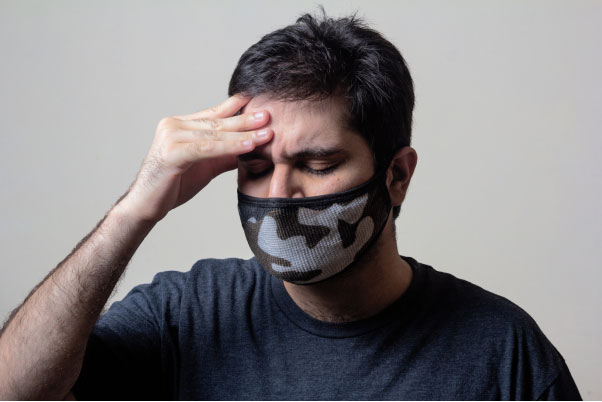Migraine Headaches: Symptoms, Causes, and Treatment
A Migraine headache is a little different from a normal headache. In the case of migraine headaches, individuals typically experience pain on one side of their heads. The pain isn’t constant; it’s similar to a throbbing or a pulsating sensation. Sensitivity to light, nausea, and vomiting usually accompanies migraines. These headaches can last several days and be so severe that they become a hindrance in your day-to-day activities.

A rare symptom called aura also affects some people. Aura includes disturbances. When a person experiences aura, they can see bright light spots, experience tingling on the side of their face, arm, or leg, and may find it difficult to speak.
Causes of Migraine Headaches
Although the exact causes of migraines are unknown, research indicates that heredity and external conditions play a part.
It's believed that alterations inside the brainstem or its exchanges with the trigeminal nerve, a significant pain channel, are to blame. Unbalances in brain chemicals, such as serotonin, which helps your nervous system manage pain, may also play a role.
Certain factors can trigger a Migraine headache, including:
Sleep patterns shift
Sleep deprivation or excessive sleep can cause migraines.
Hormonal fluctuations
Many women experience headaches when their estrogen levels fluctuate, like before or during menstrual cycles, pregnancy, and menopause.
Oral contraceptives and other hormonal drugs can aggravate migraines. However, some women report that using these drugs reduces the frequency of their migraines.
Medications
Migraines can be made worse by vasodilators, for example, nitroglycerin and oral contraceptives.
Sensitivity
Migraines can be triggered by bright or flashing lights, as well as loud noises. Perfume, paint thinner, second-hand smoke, and other strong odors can cause migraines.
Stress
Migraines can be brought on by stress at home or work.
Physical Activity
Migraines can be triggered by strenuous physical activity, including sports, exercise, and sexual activity.
Foods
Migraines may be triggered by aged cheeses, as well as salty and processed foods. Skipping meals could also have a similar effect. Alcohol and caffeinated beverages may also cause migraines.
Weather Shifts
A migraine can be triggered by a change in weather.
Symptoms of Migraine Headaches
Symptoms of migraine headaches usually show up in 4 stages. Not all people go through all the stages.
Prodrome
You may detect small changes that indicate an impending migraine a day or two before it occurs, such as:
- Neck stiffness
- Constipation
- Changes in mood, ranging from sadness to happiness
- Frequent urination.
- Fluid retention
- Hunger
- Excessive yawning
Aura
Auras can appear both before and during migraines for certain people. Aura is a reversible nervous system symptom. Visual disturbances are the most common symptoms. However, other types of disturbances might also occur sometimes. Each symptom normally starts slowly and grows up over many minutes, lasting up to an hour.
The following are some examples of migraine auras:
- Loss of vision
- Seeing bright spots, diverse shapes, or flashes of light
- Speaking difficulty
- Weakness or numbness on one side of the body or in the face
Migraine Attack
If left untreated, a migraine can persist anywhere from 4 to 72 hours. The frequency with which migraines strike differs from individual to individual. Migraines can occur once a month or multiple times a month.
You may have the following symptoms during a migraine attack:
- Throbbing pain one or both sides of your head
- Light sensitivity
- Sound sensitivity
- Touch and smell sensitivity
- Nausea
- Vomiting

Post-Drome
You may feel fatigued, bewildered, and drained out for even a day after a migraine episode. Some people claim to be overjoyed. A sudden head movement may reactivate the discomfort for a brief period of time.
Treatment of Migraine
Medical Treatment
According to an article published in Medical News Today, there is no known cure for migraines. However, there are medications to relieve the symptoms and pain.
Pain relievers and other medications can often be beneficial. Taking medicine as soon as symptoms appear can help prevent them from worsening.
The following over-the-counter pain relievers are commonly used for treating migraines:
- Acetaminophen
- Naproxen
- Ibuprofen
Other possibilities include:
- Antiemetics: to manage any nausea and vomiting
- Ditans: to interact with 5-HT1F receptors on sensory nerves and blood vessels
- Gepants: to block a protein involved in inflammation and pain called calcitonin gene-related peptide (CGRP)
- Triptans: to help correct the brain changes that take place during an episode

Taking too many medicines can be counter-productive and result in a headache itself. Consultation with a doctor is necessary before taking any of these medicines. You can talk to a doctor online from the comfort of your home with the help of TelMDCare.
Home Remedies and Supplements
The following practices can help alleviate migraine symptoms at home:
- Using icepacks or ice bags that are flexible
- Resting/sleeping in a calm and dark room
- Neck exercises
- Physiotherapy

Preventative Measures
Preventative measures for migraine headaches include avoiding the migraine triggers. For example, if you suspect a certain food or drink induces migraine headaches for you, you need to avoid it. Similarly, if a physical activity results in a migraine, you need to reduce the exertion or limit doing that activity.
Apart from this, you should practice relaxing techniques, avoid stressful situations as much as possible, maintain a good posture, and stay active. All of these things can help you stay healthy in general, and can also help reduce the frequency of migraines.
If you routinely get migraines, taking preventative measures isn’t enough. You need to consult a doctor. TelMDCare brings you an online healthcare service with licensed online doctors. We offer consultations for multiple health problems, including migraine headaches. Our virtual doctor will diagnose you or guide you on what further steps to take. Contact us now or book an appointment in order to speak with a doctor online.